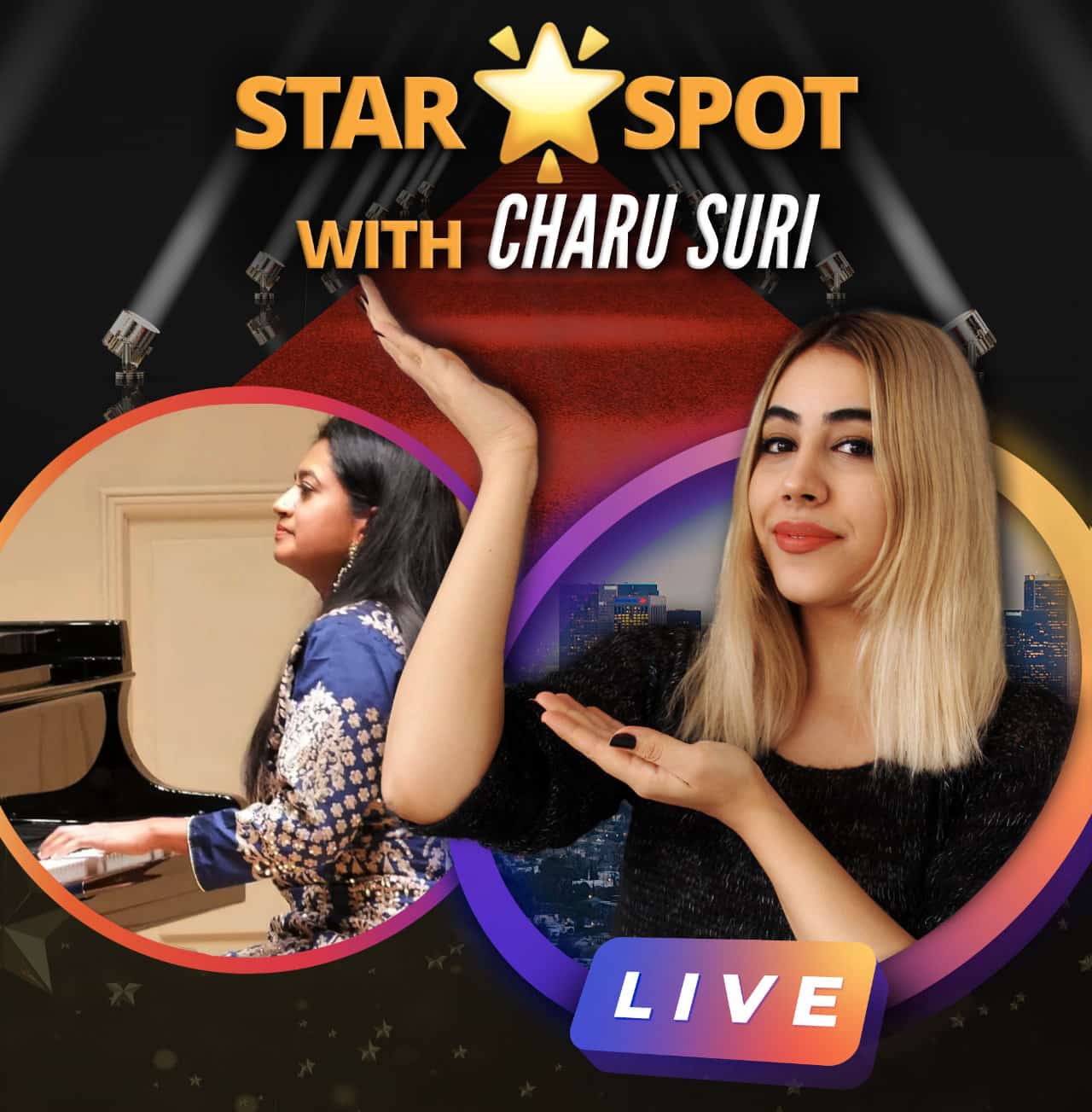Star Spot with Charu Suri, Indian ragas and Sufi music influenced jazz pianist and composer
Award-winning Pianist Charu Suri on Career and Artistic Integrity: Exploring the Influence of Indian Ragas and Sufi Music in her Jazz Composition and Performance
Welcome to this episode of Star Spot! I’m Merry, and in this series, I interview InterContinental Music Awards winners and insiders, bringing you exclusive insights into the music industry. Today, I’m thrilled to have with me Charu Suri, our 2022 winner!
I had the pleasure of interviewing Charu Suri, a talented pianist and composer who recently won the InterContinental Music Awards. Charu’s unique approach to music combines a range of global influences, including Indian ragas, Sufi music, and the trio. Her groundbreaking albums, The Book of Ragas, and The Book of Ragas vol. 2, have received high praise for their innovative sound.
During our interview, Charu spoke candidly about her challenges and inspirations. She discussed how she treads fearlessly between genres and shared insights into her creative process. With performances at prestigious venues such as Lincoln Center and St. Croix in the U.S. Virgin Islands, Charu has cemented her place as a top-tier musician.
Currently embarking on a multi-city RAGAS & WALTZES tour to India. Starting with a performance at the National Center for the Performing Arts (NCPA) in Mumbai on September 16th, Charu’s passion for music shines through in everything she does. Keep reading to learn more about this talented musician and her journey in the music competition and contest world.
Let’s dive right into the interview summary and tap into Charu’s fascinating journey and insights as a musician… The full interview is available on Instagram – click here to check it out.
Can you introduce yourself briefly?
I’m a pianist and composer who was born in South India. And I do a lot of work blending Indian ragas and jazz. I grew up composing, and pretty much all my career, I was a concert pianist playing at an early age in concert halls all over the world. When I moved to the United States, I fell in love with jazz and was inspired by the traditions of New Orleans.
I went on a trip to New Orleans, and that’s when I realized that blending Indian styles into jazz was my voice. I wanted to inspire and motivate a lot of people to follow their own voice. So, I became the first Indian-born jazz artist at Carnegie Hall, and I’ve played there three times. I’m honored to be playing there for the fourth time this year. I’ve composed four albums and am getting ready to release my fifth album, which I’m very excited about.
When can we expect your new album to be released?
We’re recording the album in mid-March, and we’re hoping to release it after the summer. For this album, I’ll be playing with the legendary Chick Korea’s double bass player. Also John Patitucci, and Joe Lastie from Preservation Hall in New Orleans.
Can you tell us more about the upcoming album and what inspired it?
The upcoming album is a blend of Indian ragas and jazz. I’ve always been inspired by the traditions of New Orleans, and I wanted to incorporate that into my music. Working with John Patitucci and Joe Lastie has been amazing, and their unique styles have added a new dimension to my music. I’m excited to share this album with my fans and hope they enjoy listening to it as much as we enjoyed making it.
How did you know that music was what you wanted to do with your life?
It’s such a good question, and for me, it’s hard to imagine my life without music. I was one of those kids who would practice for eight hours a day, and my parents would have to tell me to stop. Music brought me so much joy and was the only thing that motivated me.
I can’t imagine myself not creating and expressing my own voice through music. Every time I stepped away from it, it pulled me back and made me want to be more authentic and creative. So, that’s been my whole journey. It’s been my destiny, I suppose.
What is the source of inspiration behind your incredible work?
For me, it’s all about real human emotions and authenticity. I have put in a lot of hours and hard work to develop my virtuosity and skill, but I want my music to be real and very much from me. While I listen to a lot of music and am influenced by different styles, the sincerity and authenticity of my journey keep pushing me forward.
I see a lot of contrived and insincere things happening in the world, and I don’t want to be a part of that. It’s crucial for me to be my authentic self and maintain my integrity. This platform allows me to develop my authentic voice without compromising my standards and values, and that’s what keeps pushing me forward.
How would you describe the music you create and categorize it?
I call my music Raga Jazz, as it combines improvisation, harmony, and melody, taking inspiration from Indian ragas – melodic scales rooted in ancient traditions. While it borrows from jazz traditions, it also has a unique blend of Sufi music and mysticism, making it a genre-defying category.
It takes three different cultures rooted in the art of improvisation and brings them together, which is why it’s hard to categorize. Some people call it new age, world music, or jazz, but it’s truly a blend of all three. It reflects my journey as a creator, and I believe that’s what makes it inspiring and special.
How do you start working on a piece and what are your steps in the creative process?
A: I believe that music is rooted in emotion and feeling, and my creative process aims to capture that. I try to take the listeners on a Sonic Journey, and for that, I draw inspiration from Indian ragas, which encourage one to slow down and savor the moment. I begin by trying to capture the essence of a particular mood or time of day and try to create a piece that embodies that feeling. It’s like taking a meditative and transportive journey through sound. In essence, my creative process involves slowing down, savoring the moment, and capturing that feeling in my music.
What was your takeaway from your experience with InterContinental Music Awards?
I heard about it a few years ago when one of my friends won one of the awards. I really admired their work and thought it must be an amazing program if they wanted to recognize my friend’s music. Then I discovered the organization and applied the following year.
I was nominated and last year I won two categories, which were amazing. It’s been great because it’s been a wonderful connector to other artists that I have admired across the world. My takeaway from my experience with ICMA was that it is a wonderful community of excellent artists, and the screening process was rigorous.
I was honored to be a finalist in a jazz category in my first year of entering, and then the following year, I won two categories. The caliber of entries is very high, so it was a real honor for me to be there. Moreover, the people who reached out to me through the InterContinental Music Awards community, the winners, and the nominees have been very supportive, and it’s been wonderful to be a part of it.
What were the challenges and ups and downs of your music career and how did you handle them?
When I started my music career, I faced many challenges, especially in creating something new that pushed the boundaries. I found that everyone in the jazz industry wanted the same old sound, but I didn’t want to sound like Billy Holiday or Bill Evans. My own band didn’t understand the sound that was in my head because it was so new and a blend of styles.
I had to keep pushing and be true to my voice and not give in to the pressure of sounding like someone else. It took a lot of sincerity and staying true to my sound to get to where I am now. The key to success in a music career is to be true to yourself and not try to sound like other people. I’ve received amazing feedback from people who love my music and appreciate the groundbreaking sound I’ve created.
I think the world we live in now tends to feed into the Spotify playlist and radio stations. And if your music doesn’t sound like what you’re used to hearing on those platforms, there’s immediate pushback. However, I believe we need to find a way to blend genres and create something fresh and new. In my next album and future albums, I plan to blend different cultures and languages to create something unique.
What was the best advice you received about your music career?
The best advice I received came from Arturo O’Farrell, a multi-Grammy winner who wrote my Grammy recommendation to join the Recording Academy. He advised me not to be influenced by what others expect from me and to follow my creative process. Also encouraged me to take my time with my work and not to worry about fitting into certain genres or venues.
Not every avenue is a fit for everybody. And it’s important to find the avenues that are a fit for your voice. O’Farrell said that just because I’m not playing at a certain place doesn’t mean I’m not a good artist. And that the venues and opportunities that are a fit for my music will come as I continue to put out good, authentic music.
I’ve applied this advice throughout my career and have played at venues like Carnegie Hall, Lincoln Center, and Birdland Jazz Club, and have toured all over the world. It’s important to embrace and acknowledge your path and your voice and to respect that your sound doesn’t have to be a fit for every single avenue or every single audience.
What are your plans for recording more professional videos?
As a Steinway partner and teacher, I have the privilege of using their amazing pianos to record my videos. I’ll be recording more professional videos soon, and you’ll see me playing on different pianos every time, which is exciting!
What would you like to share with your viewers and fans?
I would say that integrity is a crucial value to uphold. It’s not an easy word, and it takes a long road to figure out what you really want to do and how you want to do it. But once you do, stick to it, and don’t give up on it. There are no shortcuts. It takes a lot of hours of work, revisions, drafts, and rehearsals to produce something worthwhile.
Even when you think no one’s listening, someone is. During the pandemic, I did a lot of live streams, and I received hundreds of emails from people saying that my music saved them. It was reassuring to know that someone was listening. Don’t underestimate your worth, and follow your heart.
If you do, you’ll find listeners and supporters who appreciate your work. I found incredible connections that I never thought were possible. Like playing with the legendary folks from Preservation Hall in New Orleans, Chick Corea’s double bass player playing in my album, and playing in a castle.
Charu Suri’s Contact Info:
- Website: https://www.charusuri.com
- Instagram: https://www.instagram.com/charusurimusic/
- Youtube: https://www.youtube.com/@CharuSuriTrio/videos
Click here to watch the full interview on Instagram
InterContinental Music Awards Team


